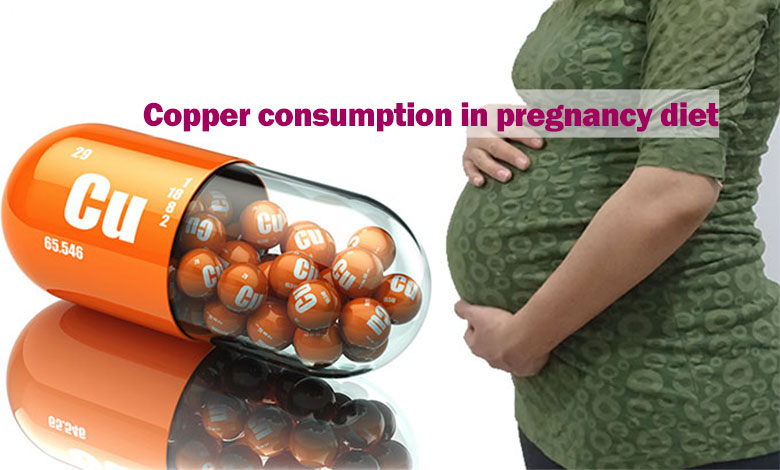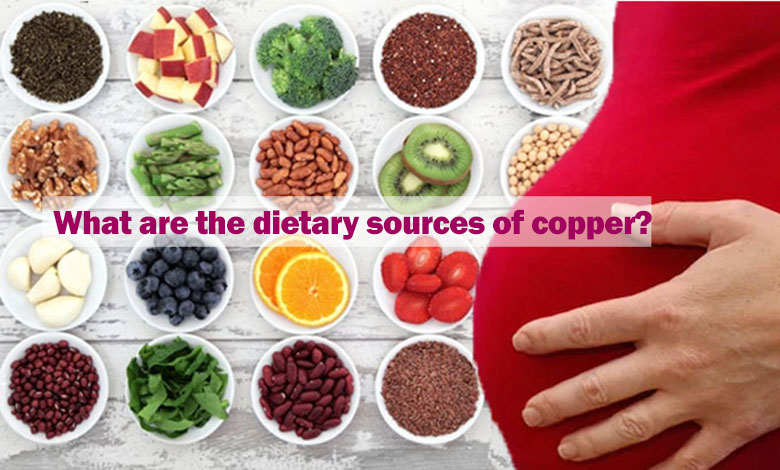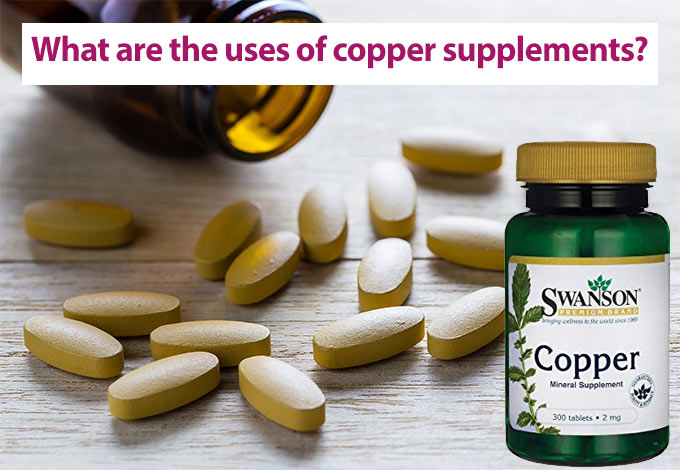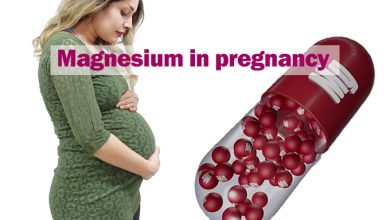Copper consumption in pregnancy diet

Copper is a trace mineral found in the tissues of all plants and animals and is vital for the production of red blood cells, which is especially important during pregnancy as blood volume doubles.
The body stores copper mainly in the bones and muscles, and the liver regulates the amount of copper in the blood. In this article, learn more about the amount and necessity of copper consumption during pregnancy. should copper supplements be taken?
It is necessary to consume copper during pregnancy. Copper is a rare mineral found in all plant and animal tissues. Copper consumption is necessary for the formation of red blood cells. This is especially important during pregnancy when your blood volume doubles.
Eating copper during pregnancy also helps in the formation of the baby’s heart, brain, connective tissue, blood vessels, and immune, skeletal, and nervous systems. Copper also enhances the body’s ability to repair tissue and metabolize sugars, which makes hair grow and look healthy.
Related article: vitamins for pregnancy
Why do you need copper during pregnancy?
Copper is essential for the production and storage of iron. Copper helps form the heart, blood vessels, bones, and nervous system of the fetus, and strengthens the body’s ability to repair tissue and break down sugars. Copper will also aid in hair growth and health.
How much copper does the female body need?
The woman’s body needs copper in different periods, which are as follows:
- Non-pregnant women from 19 to 50 years: 0.9 mg per day
- Pregnant women: one milligram per day
- Breastfeeding women: 1.3 mg per day
But you don’t have to get the recommended amount of copper every day. Instead, you can take it for several days or a week, so that your average daily intake equals the recommended amount.
What are the dietary sources of copper?
Some good sources of copper that you can consume during pregnancy are listed below and opposite to them the amount of copper in that food item is stated in the form of milligrams:
- 28 grams of raw cashews: 0.6 mg
- 28 grams of roasted sunflower seeds: 0.5 mg
- 28 grams of roasted hazelnuts: 0.5 mg
- A glass of cooked lentils: 0.5 mg
- 28 grams of almonds: 0.3 mg
- Two tablespoons of seeded peanut butter: 0.2 mg

Do not cook in uncoated copper pots where the copper comes into direct contact with the food. Cooking in these pots can increase your copper intake to toxic levels. But the pots that only the outer part is made of copper or the copper is combined with other types of metals such as steel are safe.
Should You Take Copper Supplements?
If you eat a healthy and varied diet, chances are you’ll get enough copper. Copper is found in seafood, nuts, seeds, whole grains, vegetables, and even cocoa products, so there’s no need to supplement.
Even if your diet doesn’t include these foods, a good pregnancy multivitamin usually contains enough copper that you don’t need to take a separate copper supplement.
It is also possible that you get more copper than required, which is not suitable. Therefore, talk to your doctor before taking any additional supplements. However, copper supplementation is likely safe in oral form.
However, pregnant or breastfeeding women should not get more than eight milligrams of copper per day if they are of 14 and 18 years old, if they are 19 years old, they should not get more than 10 milligrams per day.
Taking the oral form of copper supplements in higher doses is also probably unsafe, and higher amounts may even be dangerous.
Copper deficiency is not common. Women of reproductive age sometimes suffer from copper deficiency, but you may not notice any symptoms. If you are concerned about not getting enough copper, talk to your doctor before taking a supplement.
What are the uses of copper supplements?
Copper supplementation is used to treat copper deficiency and the resulting anemia, although copper deficiency is rare.
Copper deficiency sometimes occurs in people who get too much zinc through diet or supplements, people who have had gastric bypass surgery, or are fed through a tube.

However, there is no evidence that people who eat a normal diet need to take copper supplements, and even athletes don’t need to take extra copper if they eat a good diet.
What are the benefits of consuming copper during pregnancy?
Copper is an essential mineral that performs many functions in the body. This mineral maintains metabolic (fuel and metabolism) health, improves bone health and strength, and maintains the proper functioning of the nervous system. Copper is an essential nutrient for the body, necessary for both the health of the mother and the proper growth and development of the fetus.
The most important benefits of the consumption of copper during pregnancy are:
- Consuming copper along with iron during pregnancy enables the body to form red blood cells. It also facilitates the absorption of iron in the body.
- This substance helps maintain blood vessels, regulate heart rate and blood pressure, and prevent cardiovascular disease.
- It helps to activate the body’s immune system and improve its performance.
- It plays a role in maintaining healthy bones and prevents osteoporosis and arthritis.
- Prevents prostatitis or inflammation of the prostate.
- It plays a role in the development and maintenance of bones, connective tissue, and organs such as the brain and heart.
- It plays a role in the development and regulation of the nervous system.
- Copper deficiency is associated with high cholesterol and hypertension.
- Copper plays an important role in maintaining collagen and elastin, the main structural components of our body.
- Copper has antioxidant properties and prevents skin aging and cancer along with other antioxidants.
- Copper probably prevents the onset of cognitive disorders such as Alzheimer’s and Parkinson’s.
How much copper should be consumed during pregnancy?
The number of copper consumption increases during pregnancy. Pregnant women need about 1 mg (1,000 micrograms) of copper per day; While women between the ages of 19 and 50 need about 0.9 mg of copper per day. The amount of copper consumption also increases during breastfeeding and will reach approximately 1.3 mg per day.
It is not necessary to get the required amount of copper every day; It’s also okay if you can get the amount of copper you need during pregnancy in a few days or a week.
People with any of the following conditions should take more copper:
- Intestinal diseases such as celiac disease
- kidney Diseases
- Pancreatic disease
- Reducing the size of the stomach (slimming surgeries)
- Having constant stress
- History of body burns
- High intake of zinc
- Menke’s disease (a type of genetic disorder that makes copper absorption difficult.)
What are the consequences of copper deficiency for the fetus and mother?
Serious copper deficiency in the fetus is very rare because the fetus takes its own needs from the body. But if you don’t take copper consumption seriously during pregnancy, you may have a copper deficiency yourself. In this situation, you may experience one or more of the following symptoms:
- Anemia
- Decreased body temperature
- Osteoporosis or even broken bones
- Decrease in the number of white blood cells
- Irregular heartbeat
- Pale skin
- Thyroid problems
- Increased pregnancy blood pressure
What are the side effects of excessive copper consumption during pregnancy?
Copper toxicity is rare, but if it occurs it can be identified by a variety of symptoms; Including:
- Digestive problems (stomach pain, nausea, vomiting, diarrhea)
- Headache
- Dizziness
- Weakness
- Black stool
- Metallic taste in the mouth
- Irregular heart rhythm
- Liver cirrhosis
- Jaundice
- Heart problems
- Abnormalities of red blood cell
Even if your diet doesn’t include these foods, a good pregnancy multivitamin usually contains enough copper that you won’t need to take a separate copper supplement. It is also possible that you get more copper than required, which is not suitable. Therefore, talk to your doctor before taking any additional supplements, never start taking copper on your own while pregnant, and always consult your doctor before starting any medication or supplement.
Is it necessary to take copper supplements during pregnancy?
It is unlikely that someone will get copper poisoning from normal food consumption. But consuming contaminated food and water, or working in an environment with high copper levels, increases the possibility of getting this poisoning. If you are concerned about the level of copper in your body, see a doctor. Your doctor will examine you and may also test your blood copper levels.
Note: It is not recommended to cook food in copper dishes during pregnancy or drink tea in a copper cup; Because direct contact of food with copper may increase the level of copper in your body to a toxic level. Therefore, it is not recommended to use copper utensils during pregnancy.
